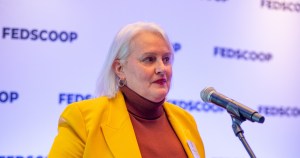“An amazing waste of money and time.” Commerce CIO calls for digital services reformulation

An integrated group of government portals that would allow users to easily find and access benefits and services from any device is where the future of government digital services should be heading, Department of Commerce CIO Andre Mendes said Thursday.
Speaking at FedScoop’s annual FedTalks event, Mendes proposed that the U.S. should have “federal, state and local government portals that allow you to navigate through the thing in your app, on your mobile phone, and get access to every system that you need to.”
“And that is possible — built around the persona, the citizen and not the government, toward 100%, navigable self-service,” he added.
Mendes pointed to Estonia as an example of a nation that is already doing this. And to get to that point, he said, the U.S. must “shed all of our legacy modus operandi,” calling the way that many federal agencies create IT strategies independent of the commercial market and overly customize commercial software “an amazing waste of money and time.”
“We cannot continue doing the same thing that we’ve been doing and expect to get to a radically different place as fast as we need to by doing so,” Mendes said. “It is impossible, we must shed the way that we do all business.”
Mendes noted also how most of the information hosted on agency websites is extremely old.
“Information is often outdated, inaccurate and late,” Mendes said. “I mean, you can go into a website for a government agency and you will find an unbelievable amount of obsolete information. I don’t care which agency it is.”
To drive this transformation, Mendes said government agencies should rely only on technology that commercial organizations have developed with minimal to no customization rather than building their own.
“Almost every online presence must be replaced,” Mendes said. “You’re talking about literally millions upon millions of web pages that must go. So this is an enormous task.”
In his keynote, Mendes gave recommendations on what current CIOs should do to encourage and support the move towards more modernized, commercial digital services.
“Aggressively extract commodity, you cannot afford to be running systems in your shop,” Mendes said, among other suggestions. “You cannot, you should not be doing this…. You should be designing and modernizing applications, aggressively consolidate applications and operations.”
Since the commercial sector has moved toward apps on mobile devices that go through near-constant updates, Mendes said that CIOs must embrace that change and be bold in reflecting it.
“Rededicate your career to momentous change,” Mendes said. “Just go out there and knock it out of the park.”




